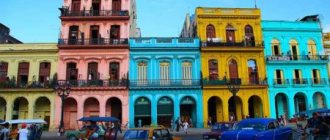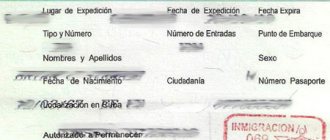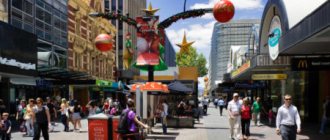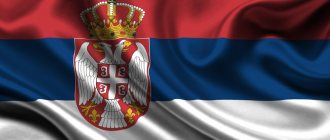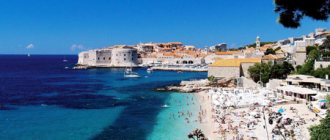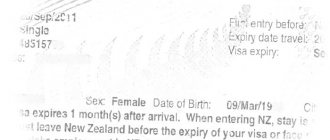Housing
Rent
In Cuba, you can rent housing from the state or from private individuals. In the first case, most likely you will live in a two- or three-room house near the beach. The minimum rental price for such a house is $100 (5,650 rubles) per day. The cost of housing in the private sector depends on amenities and services, such as the availability of breakfast and dinner. There are rooms that rent for $15 (848 rubles) per night. You can rent a good apartment or house from private owners for $70–80 (3,955–4,520 rubles) and more. Long-term apartment rental costs an average of $300 (16,950 rubles) per month.
In Moscow, a one-room apartment in a good area can be rented for 40–50,000 rubles per month.
Directions
Urban transport
Public transport in Cuba is in such a state that it can be said that it does not exist. There are no metro, no trams, no trolleybuses. Only buses that run very rarely. Cubans joke that buses are like women: you can wait for them all your life. We recently got new air-conditioned buses, but they are also difficult to get on. Bus travel costs 1 CUP (2.2 rubles).
Private minibuses are more popular. These are old cars from the 50s, which craftsmen drive along a certain route. One not too long trip on such a minibus will cost about 10 CUP (22 rubles).
Travel on Moscow transport - metro, bus, trolleybus or tram - with a Troika card costs 36 rubles. You can buy a pass for 60 trips for 1,765 rubles or an unlimited pass for a month for 2,075 rubles.
Taxi
Uber and there are no analogues in Cuba. Tourists and some locals use government-owned yellow taxis. We also have private taxis, but they can only be called through friends. A trip from the airport to the center of Havana costs 18 euros (1,255 rubles). And you can get around the city for 3–4 euros (209–279 rubles).
The most profitable way to order a taxi in Moscow is through apps - Uber, Gett, Yandex.Taxi and others. You can get from the airport to the center for 1,000–1,500 rubles. A trip from a residential area to Red Square will cost approximately 350–500 rubles.
Personal car
There really are a lot of vintage cars in Cuba. They are considered national treasures: they cannot be exported or sold to foreigners. At the same time, ordinary Cubans are also not allowed to buy cars from abroad. Therefore, such ancient cars are very expensive and often break down. A liter of gasoline in Havana costs from $1 (57 rubles). For comparison: in Moscow 92 gasoline costs approximately 38 rubles.
Ways to move to Cuba for permanent residence
To move to Havana for permanent residence, you will need to prove your legal presence in the country. To do this, they use common emigration methods that you need to pay attention to:
- Business immigration.
- Marrying a Cuban.
- Proof of Cuban roots.
Business immigration
Immigrating for business to an island washed by the Caribbean Sea is available to any foreigner. Just recently the foreign investor program was launched and all the commotion among entrepreneurs in Russia, the USA, and Latin America happened after the adoption of Law No. 118 in 2014. It describes in detail benefits, guarantees, protection, stages of registration, taxation, working conditions, and accounting reporting.
Opening a business in a foreign country always involves risks. If the goal is “emigration”, there is a desire to settle permanently in Cuba, then this option is the most promising. This is evidenced by the following reasons:
- free market in various industries - food and light industry, construction, mining and oil sectors, tourism;
- you can create your own business or join local entrepreneurs;
- minimum investment amount is $5000;
- variety of regions - Havana, Santa Lucia, Camagüey, Bacunayagua, Matanzas.
List of documents
For Russians, visa-free entry to Cuba is allowed for one month, during which time a company is opened with all procedures carried out (registration, payment of state fees, opening an account). To apply for a business visa, contact the Embassy of Cuba, where they provide the following documents:
- a completed application form with personal information in English;
- a foreign passport valid for at least six months;
- Russian passport;
- photographs taken over the last 6 months, size 3.5 x 4.5 cm, 4 pieces;
- voucher or hotel reservation, air tickets;
- business license;
- medical insurance;
- check or receipt for payment of fees;
- tax returns;
- bank certificates of availability of funds $50 per day;
- other information upon request.
Price
You can move from Russia to start a business with a profitable project and sufficient capital. To register a legal entity you will need $4550, to open an account $5000. The consular fee will be $35 per person.
Deadlines
In terms of timing, everything is individual, if all the documents are collected, the Migration Service issues a permit in 2 weeks. Also, a foreign businessman or investor needs to provide information on how often he plans to be in Cuba - for example, permanently or on business visits. In the first option, permanent residence is issued for 1 year or longer, in the second, a multiple-entry business visa will be issued.
Marrying a Cuban
Mixed marriages between Russians and foreigners are not uncommon, many of them are carried out for the purpose of emigration, others for natural reasons. Mostly girls marry Cubans and receive a temporary resident document, then apply for permanent residence. The marriage must be legalized in accordance with local requirements, then submit documents to the Migration Service.
List of documents
To obtain permanent residence due to marriage with a local, submit:
- copies of existing passports, with the obligatory provision of originals;
- birth certificate with translation;
- Marriage certificate;
- application according to the established form;
- documentation on the availability of real estate;
- Bank statements;
- other certificates.
Price
The applicant pays a consular fee of $30-50. Translation of documents written in Russian may be required. Additional translation costs are not large, on average $5-10.
Deadlines
According to reviews, after submitting documents to the Immigration Service, you will have to wait for a response from 2 weeks to 2 months.
With proof of Cuban roots
During the Soviet period, the Cuban partnership was one of the strongest. Due to diplomatic relations, many international lawyers lived in Havana, and joint scientific research was carried out with the participation of Soviet scientists. For a long time, military bases were located on Cuban territory in order to maintain security. All USSR troops were finally withdrawn in 1991, but during that time there were cases of mixed marriages, relationships, and the birth of children. There were 12,000 Russians living on the island, many later returned to Russia, so Russian citizens with Cuban roots are not excluded.
List of documents
To prove family ties with Cubans, and to move, you need to submit documentation in the following order:
- a foreign passport with a validity period of at least 6 months;
- birth certificate;
- a document confirming family ties;
- confirmation of the financial solvency of the receiving party;
- application with personal information;
- medical certificates;
- documents upon request.
Price
The emigration fee will range from $30-110, it is paid at the Cuban Embassy in Russia, the native state, or directly at the Havana Migration Service.
Deadlines
The situation is considered on a personal basis, so the period for issuing permanent residence permits ranges from 4 weeks to 3 months.
Food
Products
In Cuba, there is a card system - the state supplies residents with free food. Every family has a notebook with food stamps for the whole year. To get food, you have to stand in line - and the more scarce the product, the longer the line. The cards provide 80 grams of bread per person per day, some rice, beans, and chicken.
The quality of products from the state leaves much to be desired. For example, coffee, which is served in thin plastic bags, consists of 40% crushed peas. At the same time, there are very good coffee plantations in Cuba. A kilogram of real ground coffee can be bought for 16 euros. When I come home and buy this coffee, my dad doesn’t drink it - he’s unaccustomed to straight coffee and considers it too strong.
The food coupons provided for a month are not enough for a week. Food has to be purchased additionally, and a family can spend almost their entire budget on food.
Some products can only be bought in currency shops and from smugglers. For example, fish. Cuba is an island surrounded by sea. At the same time, we do not have a single market where fish and seafood are sold. Because private fishing is prohibited. There are state fish stores with high prices and frozen fish. Fresh fish is sold by private traders, risking a fine.
Cubans jokingly call cows “sacred animals.” Pork is sold in our markets. And beef can only be bought in foreign exchange stores at exorbitant prices. Consequently, there is very little milk in Cuba - it is powdery and tasteless. Probably someone in the village can get good milk. But there is no other in Havana.
Fruits and vegetables are also in short supply in Cuba. There are only tomatoes and avocados. One day my friends and I were walking through the market. The seller came up to us and quietly said: “I have potatoes. Hurry, everything will be sorted out now.” Surprisingly, the country has a tropical climate!
Here is the approximate cost of the products:
| Products | Havana | Moscow |
| loaf | $1.5 (85 rub.) (private bakery) | 30 rubles |
| Avocado, 1 pc. | 10 CUP (22 RUR) | 50 rubles |
| Pork, 1 kg. | $5 (283 RUR) | 300 rubles |
| Chicken breast, 1 kg. | $4 (226 rub.) | 300 rubles |
| Milk, 1 l. | $2 (113 rub.) | 70 rubles |
| White rice, 1 kg. | $1 (57 rub.) | 100 rubles |
| Pringles chips, 165 g. | $5 (283 rub.) (currency store) | 170 rubles |
| TOTAL: | 1,069 rubles | 1,020 rubles |
Cafes and restaurants
Local residents were allowed to do business quite recently - in 2016. Since then, private restaurants have been constantly opening in Havana. You can have lunch in an inexpensive cafe with local cuisine for $5 (283 rubles). You can buy Cuban “fast food” - a box of beans, rice and yucca - for $1 (57 rubles).
The last time I was in Cuba, I went to a restaurant serving Spanish cuisine. Soup, hot food and beer cost me about $13 (735 rubles). The owner of the restaurant is Spanish. I don’t know how he managed to open a restaurant in the center of Havana: for this we need good connections. This person probably knows someone at a high level.
And in Havana there is a Russian restaurant “Na Zdorovye”! There is vodka and dumplings.
There are also Cuban restaurants in Moscow. In Aruba you can eat hot soup and drink a Cuban cocktail, it will cost about 1,500 rubles. And you can have lunch in an ordinary cafe with traditional Russian cuisine for 300–500 rubles.
Standard of living in Cuba
Cuba has been a socialist country for many years, and during this period it has lost ties with many world partners. The transition to socialism occurred in the 60s after the revolution, at that time power belonged to the Communist Party, led by the revolutionary Fidel Castro. At the very beginning of his reign, radical reforms were carried out in the agricultural sector, the nationalization of industrial facilities and social transformations were carried out. Not all Cubans supported the leader; many immigrated to the United States for this reason - in turn, the American Government offered political asylum.
In 1966, a special document on the emigration of Cubans called the “Cuban Act” was developed, under its terms 2 million Cuban residents migrated to Miami. From that moment on, Cuba officially ended relations with the United States, largely due to the embargo. According to statistics, today 1.5 million Cubans live in the state of Florida - and this is the largest diaspora abroad.
Fidel Castro needed support, and gradually began to strengthen partnerships with the USSR and Latin countries, where goods were later exported and from where imports were imported. Before the collapse of the USSR, relations between states were stable, but the collapse of the Soviet Union led Cuba to another financial crisis. Despite the transition of Russia and other CIS countries to a market economy, Fidel Castro refused to take part in this and continued reforms to take root socialism. Subsequently, this made the state one of the weak and backward in the world economy.
Today, in view of recent events: the death of Fidel Castro in 2016 and the departure of Raul Castro’s younger brother from the main position of government, the party is returning the post of President and Prime Minister. Open elections are held, in which Díaz-Canel Bermúdez wins, and since October 10, 2021 he has been the current President. Realizing that Cuba is in distress, he decides to make radical changes in laws regarding free trade, private sector development, and investment policy. This is the beginning of a new era. Experts predict in the near future a sharp jump from a weak economy to a developing one. Such prospects give hope to foreigners who want to move to the “Island of Freedom.”
The main profits in Cuba come from the tourism industry, the production of nickel, sugar, luxury cigars, the banking sector is gradually developing, and oil rigs are being built. GDP is $97 billion per year, per capita accounts for $6665, annual growth in GDP is 2.2%. The standard of living is not high. If you are seriously considering emigrating here, you should analyze the pros and cons of the move.
Household expenses
We used to have clothing cards. But the quality was so terrible that they were cancelled. Nowadays you can buy clothes in a foreign exchange store for dollars. State stores sell clothes, but they are very scary and fall apart quickly. And darling. Nike sneakers from the collection before last year can cost $100 (5,650 rubles).
Many Cubans travel abroad, buy goods there and sell them here. In the private sector, basically everyone dresses up. The same sneakers can be bought from private sellers for $30–40 (1,695–2,260 rubles).
Technology in Cuba is also incredibly expensive. TVs are sold for 350–400 euros (24,406–27,892 rubles). In Russia, the same TVs cost 2 times cheaper.
Internet and mobile communications
Mobile phones came to Cuba 5 years ago. Tariffs are crazy. Each person can buy only one SIM card, put money on it and talk. $10 (565 rubles) was enough for me for 2 days. I don't think it's much better there now.
If you walk through a park in Havana, you will notice places where many Cubans are sitting with their phones. They relay the Internet there. To gain access, you need to buy a card for $3 (170 rubles). It lasts for about an hour.
The Internet is just beginning to be brought into homes. It costs about $30 (1,695 rubles) per month. The speed is terribly slow. When I send an email to my brother, I make sure that there are no more than two photos in it - otherwise it won't get through.
In Moscow, I spend about 600 rubles a month on mobile communications. Home Internet costs the same amount along with television.
Lifespan
Life expectancy in Cuba is quite high. An example of this is the Comandante who lived to an old age.
The reasons for this fact are the absence of synthetic food products; all food is natural and simple. Here people eat at home; it is not customary to go to cafes and restaurants. They often cook it right in the yard over a fire, since it is too hot in the house.
Again, affordable medical care plays a role, despite the fact that pharmacies have a very modest range of medications.
Another reason is the low development of industry, that is, the favorable state of the environment.
It is surprising that Cubans smoke almost from early childhood, and in large quantities. Their pockets are literally filled with cigars. At the same time, the addiction does not particularly affect their health.
A positive attitude in life is another huge plus for a long life expectancy. Despite the modest life of most of the population in Cuba, people never lose heart.
Only foreigners you meet on city streets look sick here.
So you can talk about what life is like in Cuba as much as you like. The inhabitants of the country themselves are quite happy, since they are not yet spoiled by the benefits of civilization, which, however, may change in the near future.
Sport
There are state stadiums in Cuba. You can study there absolutely free, but they are in complete ruins. Recently, private gyms began to open and immediately became very popular; it became fashionable to be fit. A monthly subscription costs about $20–30 (1,130–1,695 rubles).
There is no shortage of fitness clubs and gyms in Moscow. It is most profitable to buy an annual subscription. Depending on the club, the cost of a yearly subscription starts from 8,000 rubles, with an average of 15–20,000 rubles.
Education
Life in Cuba today is possible with such small salaries for several reasons, except food cards. At all levels - from kindergartens to higher educational institutions - education is free and public, although recently there have been attempts to open private educational institutions. Its level is currently low, although previously Cuban schools were famous for their teachers. Now the old teachers have retired, and the new ones are former school graduates who do not have a proper education.
Entertainment
In Havana you can go to discos. The last time I was at a performance by a famous singer. I paid 5 euros (349 rubles) for entry. You can buy beer at the disco for 2 euros (140 rubles), a bottle of rum for 15 euros (1,046 rubles).
By Cuban standards, this is a bit expensive, so young people prefer to have fun on the street. Locals jokingly call the Havana embankment the longest bar counter in the world. People come there with alcohol, drink, play the guitar.
A couple of years ago private owners opened cinemas, there was even 3D. You could go to the cinema for 1 CUP (22 rubles). But the state could not control the films that were shown there. Therefore, private cinemas were banned. There are terrible government ones left, no one goes there.
In Moscow, you can go to a concert of a popular Russian performer for 2,000 rubles. A movie ticket costs 300–400 rubles.
Rum and cigars
The famous Cuban rum is really very good. Only Dominican and Guatemalan drinks can compare with it. In Cuba, a bottle of Havana Club rum costs about 11 euros (767 rubles). This rum can be bought in Moscow for about 2,500 rubles.
Cuban cigars are a unique product that is grown in a special microclimate. Some craftsmen exported seeds from Cuba and tried to grow them in the Dominican Republic, but it didn’t work. Unfortunately, our tobacco plantations are state-owned, and so are the factories where cigars are made. Workers at factories receive meager wages and try to export these cigars. Many Cuban cigars that enter the Russian market are contraband. Basically they are not up to standard.
In Cuba, a box of cigars (25 pieces) can be bought for $200 (11,300 rubles). Yes, the country that produces cigars sells them to its residents at European prices. This is unthinkable! In Moscow, such cigars cost approximately $300 (16,950 rubles) per box.
Emigration routes
It is possible to go to Cuba for permanent residence. Of course, emigrating to Liberty Island is not as popular as moving for permanent residence to the USA and Europe. But many people from different countries of the world choose life in the Caribbean as an alternative to their home country. The most common option to stay in Cuba forever or to visit there without restrictions is to obtain resident status. This is actually an analogue of a residence permit, which does not exist as a legal concept on the island.
This is what a Cuban citizen's passport looks like
Thus, resident status is practically the same as Cuban citizenship.
Resident status, or equivalent to a residence permit
Gives all basic rights, including:
- free medicine;
- free education for children.
However, residency does not oblige you to undergo compulsory military service. Status can be of two types:
- Temporary. Give at least 3 months. The basis for receiving it may be, for example, study, work or treatment. The status does not give the right to purchase real estate and vehicles. In addition, once you receive it, you cannot run your own business. Citizens who stay on the island for more than 90 days are required to either apply for this type of residence or leave the country.
- Constant. They are given for an indefinite period. The basis for receiving may be, in particular, marriage or family ties. The status gives the right to purchase real estate and vehicles.
temporary resident status in Cuba
Having received it, you are allowed to personally engage in entrepreneurial activity. Permanent status is essentially the closest thing to a residence permit.
Other emigration options
- Start business.
- Get a job in your specialty.
- Get married.
- Prove Cuban roots.
- Apply for refugee status.
Starting a business
To open your own business in a Caribbean state, you need to contact the Cuban consulate. If the experts give the go-ahead, you will have to deposit money and prove your financial capabilities. At the same time, the authorities can allocate premises on the island for business activities. This method of emigration is quite young. Each specific case is considered individually.
Getting a Job
As a labor force, Cuba attracts mainly those who can go into low-paid positions. First of all, those that local residents refuse - harvesting sugar cane on plantations and other agricultural work.
This method of emigration is preferred by young people, hoping to find a more prestigious occupation in the future. Qualified professionals may submit an application to the Cuban Ministry of Foreign Affairs. If their profession is in demand, they receive an invitation to work.
Marriage
Marrying or marrying a Cuban citizen automatically gives you the opportunity to obtain a residence permit. However, it can be extended. Marriage will allow you to engage in any legal activity on the territory of the state. Also, the spouse will have all the basic rights of a native resident of the country.
However, large property (house, land, car, etc.) purchased on the island will have to be registered in the name of a Cuban citizen. Thus, in a divorce you can lose all your property.
Emigration by origin
To do this, you need to prove the presence of Cuban roots. In addition, children born in the country automatically become Cuban citizens. In this case, the nationality of the parents does not play any role. Also, citizenship is granted to babies born abroad to a Cuban or Cuban mother.
Prices for tourists
There are three types of money in Cuba - the Cuban Peso (CUP), the Cuban Convertible Peso (CUC) and the currency (Euros, Dollars). Tourists pay with Cuban convertible pesos; they can exchange dollars (with a 10% commission) and euros. Local residents are paid in Cuban pesos.
Some restaurants have different prices for locals and tourists. This is unofficial and, of course, dishonest. One day I came to a restaurant and was mistaken for a tourist. There were Cubans sitting at the next table, and I asked them for the menu to compare with what they brought me. The difference in the cost of the dishes was approximately $1.5 (85 rubles).
Money
The monetary system in the country is completely unusual for most residents of other countries. There are two currencies: local and for foreigners. The first is the peso. Local money is privileged. When paying in shops and for services, the owners of this currency purchase everything at completely different prices, much lower than the holders of cookies - this is how the local currency is called for foreign guests of the island.
In Cuba, American dollars are not favored, nor are Americans themselves, but they are happy to take advantage of financial assistance from relatives living in America. Tourists are advised to take currency in euros with them, preferably in cash.
The best way to exchange currency is directly at Havana airport. There are exchange points both indoors and outdoors.
Moreover, those who have been here advise changing money in smaller amounts. Tourists say that tips are expected everywhere here, even in exchange offices. Many, leaving reviews about what life is like in Cuba, indicate amounts starting from $400 in tips in different establishments of the country.
Conclusion
A few years ago, Cubans believed that communism would win. Now there is no faith and everyone is trying to earn money to survive. The state only limits, you can’t rely on it. There are no opportunities to develop.
Cubans have to think like this: “I have $10 - today I’ll go to a disco, but tomorrow there will be nothing to eat.” Moreover, even with money, you can’t get anything without the right contacts - from delicious fish to important medicines.
Yes, it’s wonderful to vacation in Cuba. But I won't be able to live there anymore.
The cost of living:
For example, let’s take a month’s rent for an apartment, 60 trips on public transport, a trip around the city by taxi 2 times a week, buying a grocery basket 3 times a week, lunch in an inexpensive cafe 3 times a week, spending on the Internet, a subscription to a fitness club for a month, 1 trip to a concert and the purchase of one bottle of Cuban rum.
We get:
Havana:
40,670 rubles.
Moscow:
73,763 rubles.
Passion on black beans
Our women are reluctant to talk about the reasons for divorces from Cubans: they say they separated and went their separate ways. Although, of course, sometimes it breaks through. “Cuban men would only like to dance,” reports Lyudmila Vasilyevna from the city of Santiago de Cuba. “And they drink rum, but they don’t like to work.” Fidel thought in vain to build socialism here: they adore the revolution, but you can’t force anyone to work. My husband and I spent years without money on nothing but rice and black beans. I got tired of it, got divorced: oh, at one time there was a passion, even shoot a Latin American series. It’s not easy here, but I adore Cuba, that’s why I didn’t leave. And our Russians stand up for each other like crazy, I have friends like no other in the Soviet Union. It’s a pity, of course, that I can’t fly home: the cheapest ticket costs $700, and that’s my salary for three years. I dream of a real Christmas tree for the New Year: in Cuba for 25 years I haven’t seen a single living one, always only plastic ones.”
For most of our women in Cuba, the way of life remains the same as in the USSR 30-40 years ago: coupons, Soviet “Muscovites” on the roads and “Saratov” refrigerators at home. But that’s not what keeps them on the island. General positivity, eternal good mood and hot weather (except for typhoon season) are the key to happiness in tropical socialism. “I might have left,” admits Alla Kudaeva. “But if I hear music on the street, I’ll immediately start dancing, according to the Cuban habit... they’ll think I’m a fool.” But here it’s just the norm of life.”
